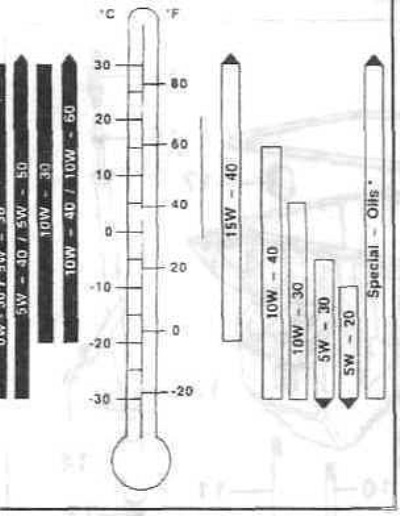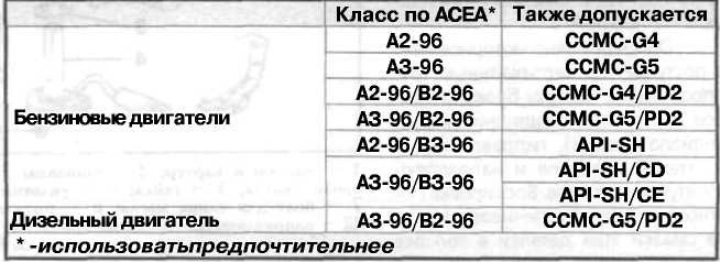The W designation in the SAE oil specification indicates that it can be used in winter.
Synthetic oils are all-weather oils on a so-called synthetic basis. Among other things, they have anti-friction additives, which reduces friction inside the engine. In addition, the scope extends up to the highest temperatures.

Application area/Viscosity classes
Black stripes are diesel engine oils, white stripes are gasoline engine oils.
Special oils 10W-X, OW-X, 5W-X must be approved by BMW.
Since the fields of application of oils with neighboring SAE viscosity grades overlap, short-term temperature fluctuations can be ignored. Mixing oils with different viscosity classes is allowed when topping up the oil, and the ambient temperature corresponds to the viscosity class of the topped-up oil.
Do not use any additives in fuel or engine oil.
Engine oil specification
Modern motor oils are alloyed oils, the properties of which are significantly improved by adding various chemical compounds to them. These additives (additives) improve protection against corrosion, provide better resistance to oxidation, including the tendency to form deposits in the engine crankcase, greater viscosity stability, better detergent and cleaning properties. Cleaning and solvent additives not only counteract the formation of deposits in the engine, but also are able to dissolve deposits and other contaminants in the oil and keep them constantly in suspension, so when changing the oil, all contaminants are drained together with the old oil.
The quality of engine oil has been designated in accordance with the American API system for several decades (API - American Petroleum Institute, i.e. American Petroleum Institute). The designation consists of two letters. The first letter indicates the area of application: S (Service) - for gasoline engines or C (Commercial) - for diesel engines. The second letter corresponds to the quality of the oil - the further it is in the alphabet, the higher the quality. Premium quality oil for gasoline engines has the designation SH, and diesel engines - CE.
European manufacturers of motor oils additionally use the specification «SSMS». This specification takes into account the peculiarities of European engine production technology. Oils for gasoline engines, in accordance with their quality, have quality classes CCMC-64 and G5, oils for passenger car diesel engines can have a CCMC-PD1 specification or a higher CCMC-PD2 specification.
The European CCMS classification has been replaced by the ACEA specification (Association of European Automobile Manufacturers), which determined the necessary checks and quality classes. Oils for gasoline engines of passenger cars, depending on their quality, can have quality classes from ACEA A1-96 to ACEA AZ-96, oils for diesel engines have classes from B1-96 to VZ-96.
Attention: Engine oils that are exclusively designated by the manufacturers as oils for diesel engines are not suitable for gasoline engines. There are oils that are suitable for both gasoline and diesel engines. In this case, both specifications are indicated on the packaging (e.g. CCMC-G5/PD2).
Engine oils for BMW 7 series cars

Oil consumption
For combustion engines, oil consumption refers to a certain amount of oil that is consumed during the combustion process. In no case should oil consumption be identified with oil leakage, which occurs due to leaks on the oil pan, valve cover, etc.
Normal oil consumption is due to the combustion of very small amounts of oil in the cylinders, due to the removal of combustion products and as a result of friction. In addition, oil is consumed at high temperatures and at high pressures, which are constantly present in the engine.
Oil consumption is influenced by the operating mode of the engine, driving style and tolerances in the manufacture of parts. The maximum allowable oil consumption is 1.5 liters per 1000 km.
Oil must be added if its level has dropped to the lower mark on the dipstick (about 1 liter of oil is required to increase the oil level on the dipstick from the bottom to the top mark).
